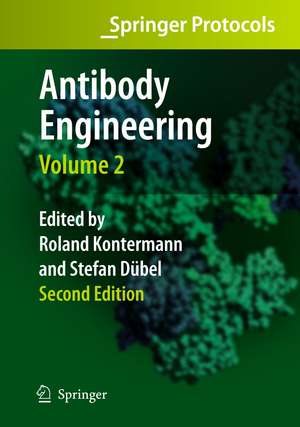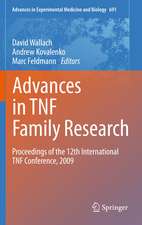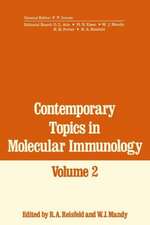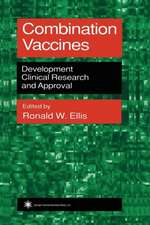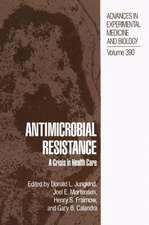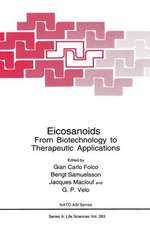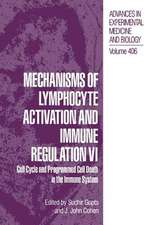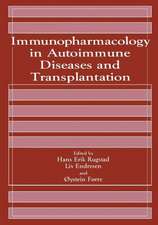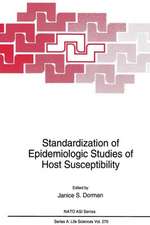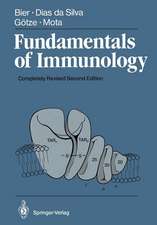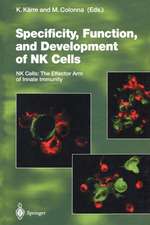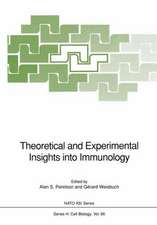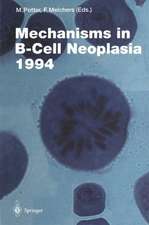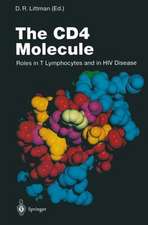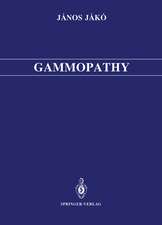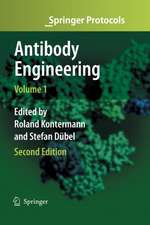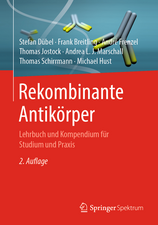Antibody Engineering Volume 2
Editat de Roland E. Kontermann, Stefan Dübelen Limba Engleză Paperback – 23 sep 2014
| Toate formatele și edițiile | Preț | Express |
|---|---|---|
| Paperback (1) | 1300.36 lei 43-57 zile | |
| Springer Berlin, Heidelberg – 23 sep 2014 | 1300.36 lei 43-57 zile | |
| Hardback (1) | 1817.13 lei 22-36 zile | |
| Springer Berlin, Heidelberg – 26 mar 2010 | 1817.13 lei 22-36 zile |
Preț: 1300.36 lei
Preț vechi: 1368.80 lei
-5% Nou
Puncte Express: 1951
Preț estimativ în valută:
248.83€ • 260.45$ • 207.10£
248.83€ • 260.45$ • 207.10£
Carte tipărită la comandă
Livrare economică 31 martie-14 aprilie
Preluare comenzi: 021 569.72.76
Specificații
ISBN-13: 9783642422768
ISBN-10: 3642422764
Pagini: 604
Ilustrații: XII, 589 p.
Dimensiuni: 155 x 235 x 32 mm
Greutate: 0.84 kg
Ediția:2nd ed. 2010
Editura: Springer Berlin, Heidelberg
Colecția Springer
Locul publicării:Berlin, Heidelberg, Germany
ISBN-10: 3642422764
Pagini: 604
Ilustrații: XII, 589 p.
Dimensiuni: 155 x 235 x 32 mm
Greutate: 0.84 kg
Ediția:2nd ed. 2010
Editura: Springer Berlin, Heidelberg
Colecția Springer
Locul publicării:Berlin, Heidelberg, Germany
Public țintă
ResearchCuprins
Bioinformatics of Antigen-binding Sites.- Analysis of Single Chain Antibody Sequences Using the VBASE2 Fab Analysis Tool.- Standardized Sequence and Structure Analysis of Antibody Using IMGT®.- Protein Sequence and Structure Analysis of Antibody Variable Domains.- Generation of Antibody Fragments and Their Derivatives.- scFv by Two-Step Cloning.- Bivalent Diabodies.- Generation of Single-Chain Fv Fragments and Multivalent Derivatives scFv-Fc and scFv-CH3 (Minibodies).- Miniantibodies.- Generation of Stably Transfected Eukaryotic Cell Lines Producing ImmunoRNAse Fusion Proteins.- Antibody–Cytokine Fusion Proteins with Members of the TNF-Family.- Recombinant Immunotoxins for Treating Cancer.- T Bodies.- Expressing Intrabodies in Mammalian Cells.- Phenotypic Knockdown with Intrabodies.- Disulfide-Stabilized Fv Fragments.- PEGylation of Antibody Fragments to Improve Pharmacodynamics and Pharmacokinetics.- Fusion Proteins with Improved PK.- In Vivo Biotinylated scFv Fragments.- Bispecific Diabodies and Single-Chain Diabodies.- Generation and Characterization of a Dual Variable Domain Immunoglobulin (DVD-Ig™) Molecule.- Isolation of Antigen-Specific Nanobodies.- CDR-FR Peptides.- Production of Antibody Fragments.- Purification and Characterization of His-Tagged Antibody Fragments.- Production of Antibody Fragments in the Gram-Positive Bacterium Bacillus megaterium.- Analysis and Purification of Antibody Fragments Using Protein A, Protein G, and Protein L.- Purification and Analysis of Strep-tagged Antibody-Fragments.- Production of Antibodies and Antibody Fragments in Escherichia coli.- Improving Expression of scFv Fragments by Co-expression of Periplasmic Chaperones.- Bioreactor Production of scFv Fragments in Pichia pastoris.- Expression of Antibody Fragments in Transgenic Plants.- Transient Production of scFv-Fc Fusion Proteins in Mammalian Cells.- Recombinant Antibody Molecules in Nanobiotechnology and Proteomics.- Immunoliposomes.- Targeted Polymeric Nanoparticles.-Antibody Microarrays for Expression Analysis.- Evaluation of Recombinant Antibodies on Protein Microarrays Applying the Multiple Spotting Technique.- Preclinical and Clinical Development.- Xenograft Mouse Models for Tumour Targeting.- Xenograft Mouse Models for Tumour Targeting.- Imaging Tumor Xenografts Using Radiolabeled Antibodies.- Human Anti-antibody Response.- IP Issues in the Therapeutic Antibody Industry.
Textul de pe ultima copertă
Antibodies are indispensable tools for research, diagnosis, and therapy. Recombinant approaches allow the modification and improvement of nearly all antibody properties, such as affinity, valency, specificity, stability, serum half-life, effector functions, and immunogenicity.
Antibody Engineering provides a comprehensive toolbox covering the well-established basics but also many exciting new techniques. The protocols reflect the latest "hands on" knowledge of key laboratories in this still fast-moving field. Newcomers will benefit from the proven step-by-step protocols, which include helpful practical advice; experienced antibody engineers will appreciate the new ideas and approaches. The book is an invaluable resource for all those engaged in antibody research and development.
Antibody Engineering provides a comprehensive toolbox covering the well-established basics but also many exciting new techniques. The protocols reflect the latest "hands on" knowledge of key laboratories in this still fast-moving field. Newcomers will benefit from the proven step-by-step protocols, which include helpful practical advice; experienced antibody engineers will appreciate the new ideas and approaches. The book is an invaluable resource for all those engaged in antibody research and development.
Caracteristici
The updated second edition of the successful Springer Lab Manual "Antibody Engineering" is now offered in two volumes with nearly the double number of protocols With both new and well established techniques Detailed step-by-step protocols including all materials and practical advices Includes supplementary material: sn.pub/extras
